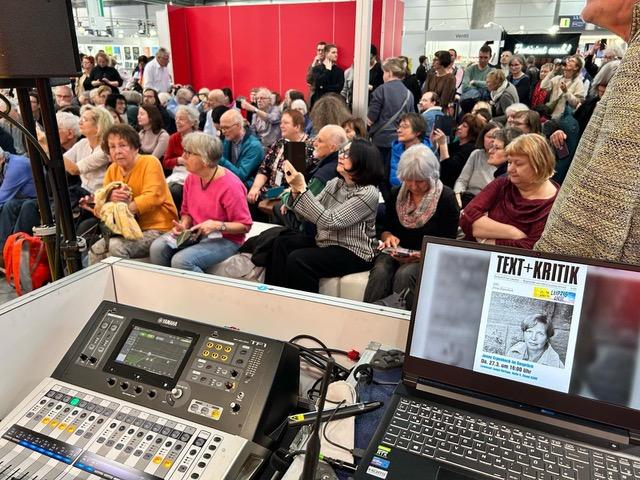
What determines which voices cross borders and reach global audiences? Why do some stories stay within their home countries while others connect with readers worldwide? Associate Professor Anke Biendarra, chair of the Department of European Languages and Studies at UC Irvine, has dedicated her scholarly career to understanding these dynamics.

In the recently published academic volume TEXT+KRITIK, Heft 246: Jenny Erpenbeck (2025), co-edited with Julia Schöll, Biendarra and seven other scholars examine different aspects of celebrated author Jenny Erpenbeck’s literary works, from her historical narrative techniques to her handling of East German generational conflicts.
Biendarra’s expertise on German literature, transnationalism, migration and memory studies informs her contribution, which focuses on Erpenbeck’s impressive – and largely unprecedented – rise as a Weltautorin (world author). Join us as Professor Biendarra explores how Erpenbeck’s unflinching examination of Germany’s fractured past has made Erpenbeck one of the most compelling literary voices on today’s world stage.
- What first drew you to study Jenny Erpenbeck’s work, and why did you decide to edit this collection?
I have been interested in historical narration for a long time, which is what naturally drew me to Jenny Erpenbeck. Her first publication, The Old Child, was published when I was writing my dissertation, whose backdrop was the literary discourse about reunification, which of course included the history of the German Democratic Republic (GDR) and how cultural memory of it was being shaped in the post-unification period. Many years later, when I was already at UCI, I was invited to an international symposium on Erpenbeck’s work and following that, wrote an essay on two of her novels, Visitation and The End of Days. The collection that was just published this March had been planned with my collaborator in Germany for a longer time. But after Erpenbeck won the International Booker Prize in May 2024, the publisher was very interested in moving up the volume for publication, so we got to work right away and got it done in record time.
Having an issue of Text & Kritik published on their oeuvre is an important milestone for contemporary German-language authors – at the book launch at the Leipzig Book Fair, Jenny Erpenbeck herself referred to it as a “knighting,” i.e. the ultimate recognition of her work in German-speaking countries. It was a great chance for me as a scholar to be able to contribute to this volume and put it out into the world.
- How does Erpenbeck’s East German background influence her writing style and themes?
To be honest, I have a hard time answering this. Due to its aesthetic strengths (i.e. her specific rendering of history and how the individual who is placed into different political systems relates to society), her work stands entirely on its own. But literary critics, both German and international, like to focus on Erpenbeck’s upbringing in the GDR, because she comes from a well-known family of writers and artists.
Her grandparents were part of the founding generation of East German intellectuals who had been persecuted by the Nazis as Communist and, when they returned from exile in the Soviet Union, helped build the socialist state and shaped its cultural politics. Jenny’s father is a well-known physicist and philosopher, and her mother was a translator from Arabic. So, her family moved in the circles of the East German intelligentsia, and she grew up fairly privileged and was able to transcend some of the confines of the GDR. For example, her family was allowed to travel to the West and when she graduated, Erpenbeck could pursue the subjects (musical theater/opera) she was interested in, studying with important East German playwrights such as Heiner Müller.
Especially with the publication of Kairos, her latest novel that deals with the GDR and its ending in the late 1980s, some German critics found that the novel was too uncritical of the GDR’s unjust regime. But I disagree with this. Sure, Erpenbeck paints a picture of the GDR she knew – because that was the country she grew up in, that shaped her. But the novel also shows how the state revealed itself in its struggle with its citizens: the care it supposedly showed them took place in a prison, and maintaining power required suppression and violence.

- What factors have contributed to Erpenbeck’s success crossing into the Anglo-American literary market?
Erpenbeck is one of the few German-language authors who has had a real presence in the Anglophone literary world. All of her novels have been translated into English (as well as many other languages) and have received a positive reception in major news outlets like The New York Times, New Yorker, The New York Review of Books, Los Angeles Times and The Guardian. The strong interest she has elicited among English-speaking critics who write for these outlets has helped introduce Erpenbeck to English-speaking readers. Especially with the translations of her last two novels, Go, Went, Gone and Kairos, Erpenbeck’s foreign readership has grown significantly, so her success is also directly linked to the brilliant translators she has worked with.
What might also be a factor is that she is represented by Andrew Wylie, who heads up what is arguably the most powerful literary agency in the world, which implies global marketing opportunities. Erpenbeck has confirmed that since she was signed by Wylie in 2018, many additional “language markets” have opened for her through translation.
- What makes her engagement with German history more accessible to international readers than other German writers?
I would argue that apart from the aesthetic strengths of her texts, it might be because the violent defeat (in the case of the Nazi dictatorship) and the peaceful overcoming (in the case of East German socialism) of totalitarian regimes remain of particular interest to international readers.
The history of 20th-century Germany provides material that is brutal, yet compelling – just think of the many stories that have shaped Anglo-American perceptions of “Germany” for decades and continue to be reinforced by internationally successful films and television productions. One need only think of the Oscar-winning films Das Boot about World War II and Florian Henckel von Donnersmarck’s The Lives of Others about the GDR – or more recently, Tom Tykwer’s series Babylon Berlin that is set in the Weimar Republic (and playing on Netflix).
So, I think that Erpenbeck’s novels affirm certain German themes for foreign readers. They narrate, in an aesthetically sophisticated way, the dichotomous history of a country that, despite its deep moral reckoning, remains somewhat enigmatic in the European context. Erpenbeck’s texts illustrate what that uncanny residue might be.
- Why do you think it’s important for English speakers to read translated literature like Erpenbeck’s, and German literature in general?
Literature in translation teaches readers so much about other cultures and histories beyond their own and shapes our perspectives on our own culture – we can compare cultural differences and similarities, and imagine ourselves in different settings and circumstances.
German-language literature is rich and varied and has shaped global literary and philosophical discourse. It might become easier to understand certain cultural traits and experiences if you read works by authors like Goethe, Kafka or Christa Wolf and Jenny Erpenbeck. Reading them in translation connects English-speaking readers to foundational intellectual traditions and stylistic innovations.
Contemporary German-language literature grapples deeply with themes that are globally resonant – memory, guilt, exile, authoritarianism, identity and otherness. These are especially relevant in an age of political polarization, migration crises and cultural reckoning. German literature provides unique personal, moral and philosophical explorations of these events in ways historical texts often cannot.
Interested in reading more from the School of Humanities? Sign up for our monthly newsletter.
